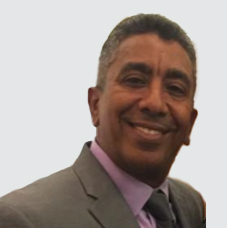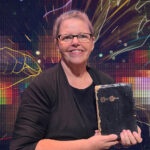
Rudy Marte
Rudy Marte is the director of multiplication for the Southeast Region Conference, which he has also served in various roles including as a member of the Ministerial Education and Guidance (MEG) Board. He previously served as the associate pastor of Iglesia Puente de Vida in Tampa, Florida. He is a graduate of Asbury Theological Seminary with a master’s degree in church planting and intercultural studies, Logos University with a bachelor’s degree in Christian education, Colegio Loyola with a bachelor’s degree in electronics, and Suffolk Community College with an associate’s degree in network design and administration. He is happily married to his wife, Griselda Marte, and they have two sons, Gasel and Randy.
By Rudy Marte
In my walk of faith, I always ask myself this question: How can the people of God have unity and also collaborate together (in order to expand the gospel to all nations both locally and globally) despite our different cultures, languages, ethnicity, and differences of opinion about things like racial justice, politics, social matters, etc. (Romans 12:4-5).
God’s purpose (through Jesus and now through us) is to bring renewal and restoration to all the world. But for us, the people of God to do this, we must be united and use the same language.
Our focus must be to live in unity so that we can fulfill God’s mission. The best vaccine we have, which will counteract division and conflict, is our unity in Christ.
My conference is led by Bishop Keith Cowart and Superintendent Mike McAvoy. It’s called the Southeast Region Conference of the Free Methodist Church. For us to be able to fulfill our mission and to ignite a movement driven by the Spirit that catalyzes the multiplication of leaders and churches, it takes unity and collaboration from all of us.
Intercultural Diversity
Our Southeast Region Conference is a multicultural/multiethnic conference. We are fulfilling our mission (what we do): “igniting a Spirit-fueled movement that catalyzes the multiplication of leaders and churches.” In this way, we can fulfill and be obedient to the mandate of the Great Commission: Make disciples, develop leaders, plant churches and multiply (Matthew 28:19-20).
_
“Something that we have to keep in mind is the great price that Jesus paid for our salvation. It was a gift.”
_m `pn
The Southeast Region Conference has four primary ethnic groups: Haitians, Portuguese, Hispanics and other Americans. This is both a great challenge and a great blessing for us as conference leaders (Ephesians 3:1–10).
The great beauty of intercultural diversity is that this diversity means we each have diverse gifts and have a unique and diverse role to play. Something that we have to keep in mind is the great price that Jesus paid for our salvation. It was a gift. It’s not that we earned it on our merits. The same is true of the diverse spiritual gifts that Jesus gives each one of us. They are a gift that Jesus gives us so that you and I can fulfill the mission of Jesus!
The only thing you and I have to do regardless of our nationality, culture or language is to commit ourselves to God and join His mission so we can see unity, intercultural diversity and collaboration between us.
Cross-Cultural Collaboration
We must celebrate cross-cultural collaboration both locally, nationally and globally. Let us be clear that each one of us forms a single body in Christ, and that our real nationality is in heaven. While we are here on earth, our goal is to ignite a Spirit-driven movement at the Free Methodist Church USA and global levels with the simple goal of making disciples, developing leaders, planting churches and multiplying.
Cross-cultural collaboration plays a very important role; it is how we help each other grow in the weakest areas to become more like Jesus. This means that we need each other to begin to express the fullness of Jesus.
_
“We must collaborate so that the kingdom of God might continue to multiply.”
_m
Each one of us may have a different culture and language. This is the beauty of cross-cultural collaboration. We must collaborate so that the kingdom of God might continue to multiply, and we will stay joy-filled and trust that one day we will all be before the throne of God (Revelation 7:9-12).
Multiplication
“But you will receive power when the Holy Spirit comes on you; and you will be my witnesses in Jerusalem, and in Judea and Samaria, and to the ends of the earth” (Acts 1:8).
This verse helps us, gives us confidence, and motivates us to see how 12 men more than 2,000 years ago created a revolutionary movement. And it helps us even more to realize that today there are more than 2 billion Christians around the world. That same Holy Spirit dwells in all our hearts today!
The sad reality is that we have not been able to identify clear disciple-making movements in our country at this time. Multiplying disciples encourages us to look back for tools for the future and our great desire to plant churches and multiply.
If we want to see truly revolutionary disciple-making movements within North American churches again, we must create a culture of disciple-making. With more than 350 languages, the United States has become the most multicultural/multiethnic nation in the world. This is great news, but also a great challenge for pastors and leaders.
One of the big problems that we face in the United States is that pastors and leaders must learn to get out of the four walls of the churches and get out of their comfort zones and reach out to their respective communities. Pastors must learn to give their disciples and leaders opportunities and allow them to make mistakes in the process of planting and multiplying churches.
Sadly, we have confused the mission of Jesus, to go and make disciples, with doing nothing. The mission of Jesus is more than preaching on Sundays and giving a Bible study on Wednesday nights (I am not saying that these aren’t part of the mission of Jesus). It is time that we wake up and understand that the mission of Jesus is much more than that. It is holistic.
_
“Jesus cared about helping, healing and meeting the needs of people physically, mentally and spiritually.”
_m
A holistic mission is one that deals with the body, mind and spirit of human beings. Jesus cared about helping, healing and meeting the needs of people physically, mentally and spiritually. Invest time with people. Jesus intentionally went to meet the leper, the poor, the prostitute and other people in need.
If we want to see multiplication:
- We must be very intentional and relational when we get together with brothers and sisters from other countries or those who do not speak our language.
Let’s show them our love, let’s be hospitable, and, above all, let’s be humble. We must learn to serve and not be served. When we learn to live in unity and knowledge of another culture and in collaboration with them, without a doubt, we will be better!
- We must realize the church is not a building.
It is you and me. It is who we are. The church that Jesus designed is for you and me to make an impact and bring transformation to our neighborhood, communities, and around the world.
- Let’s follow the example of Jesus who did not focus on the crowds.
Jesus focused on 12 people, His disciples, who were personally transformed and committed enough to the cause to be willing in one way or another to put their lives at the service of the gospel.
Leave the Walls
If we want to see a continuous multiplication of disciples, we must be very intentional with the people we are discipling. Today many churches are dying and closing their doors for lack of deep relationships with new people and their communities. To plant churches and multiply, we must give priority to a good discipleship program that shares the identity of the church, and we must reach our communities. To do that we must get out of these four walls!+

Rudy Marte
Rudy Marte is the director of multiplication for the Southeast Region Conference, which he has also served in various roles including as a member of the Ministerial Education and Guidance (MEG) Board. He previously served as the associate pastor of Iglesia Puente de Vida in Tampa, Florida. He is a graduate of Asbury Theological Seminary with a master’s degree in church planting and intercultural studies, Logos University with a bachelor’s degree in Christian education, Colegio Loyola with a bachelor’s degree in electronics, and Suffolk Community College with an associate’s degree in network design and administration. He is happily married to his wife, Griselda Marte, and they have two sons, Gasel and Randy.









